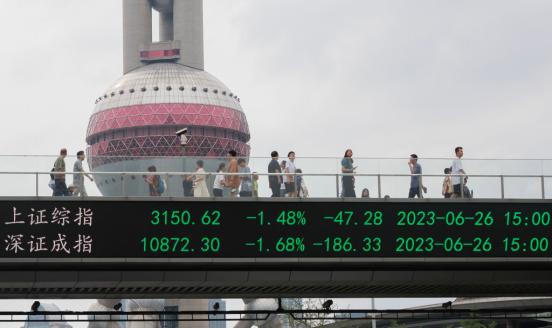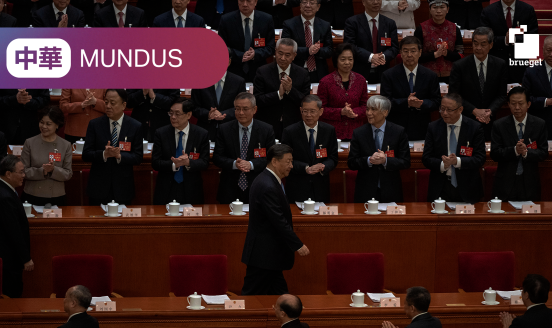Taiwan's elections: key takeaways for the European Union

On 13 January, Taiwan showed the world the vibrant nature of its democracy. Over 70% of people turned out to vote for the next President of Taiwan and the country’s legislative body, the Legislative Yuan. Lai Ching-te, leader of the liberal Democratic Progressive Party (DPP), won the presidential election. However, his party which was in government for eight years, did not secure enough votes to control the Legislative Yuan. They only secured 51 out of 113 possible seats.
The Kuomintang (KMT), Taiwan’s old ruling party which has better ties to the mainland, won 52 seats. The Taiwan People's Party (TPP) now holds the key to the control of the legislative after returning 8 seats. Taiwan’s political system is semi-presidential, which means that the DPP will still appoint the President, but legislating will be much harder for Lai Ching-te than it was for the outgoing president Tsai Ying-wen.
The speaker of the Legislative Yuan will be announced on 1 February, and it will be clearer then how the future government will look. Who the TPP sides with (the DPP or the KMT) when choosing the speaker will give a clear signal of how difficult a task President Lai will have on his hands.
The DPP will need to accept that its powers are now more limited, including how it interacts with mainland China. A softer approach will likely emerge while the degree of actual cooperation will very much depend on the TPP, whose stance on this crucial issue was not clarified during the election campaign. Mainland China has so far not reacted forcefully to the election results, possibly because it is satisfied that the DPP will be more constrained in legislative procedures going forward.
Impact on economic policies
In its campaign, the DPP made it clear that further geographical diversification of the Taiwanese economy away from the mainland is in Taiwan’s interest. Geographical diversification has happened faster for Taiwanese outbound foreign direct investment (FDI) than for trade. Taiwan’s FDI decreased from 65% during the KMT's last administration (from 2008-2016) to 35% during DPP’s last two terms under President Tsai Ing-wen. While the government did push for the so-called ‘South Bound Policy’ to invest in ASEAN countries and in India, the big increase in FDI into Japan, the United States and Germany in the semiconductor space is likely more market-driven.
For trade, the diversification process began more recently. Exports to the mainland have been very resilient, even during Trump’s trade war. Trade exports increased in 2020 to more than 40% of total exports. Exports to the mainland have decreased since then and stand at 35% today. How much this diversification process should be seen as a geopolitical move as a move to ‘de-risk’ trade is yet unknown. The surge in Taiwan’s outbound FDI – through large investments in semiconductor labs in the US, Japan and Germany – could put Taiwan’s famous silicon shield at risk, especially if the technology to produce the world’s most advanced semiconductors is transferred out of Taiwan.
So far, the EU has not benefitted much from Taiwan’s trade and investment diversification, at least when compared to the US and the rest of Asia. The lack of a trade or investment deal could be considered important, but some of Taiwan’s other trading partners are also in this position. Considering that the EU is the largest foreign direct investor in Taiwan, one wonders whether the EU should attempt to foster more bilateral economic relations. This could include increasing EU exports to Taiwan and taking advantage of outbound FDI from Taiwan in the technology space.
Down the line, the DPP will face an uphill battle to further diversify its economy away from the mainland for two reasons. First, the DPP must collaborate with the opposition on economic policies, and this may mean strengthening relations with China.
Second, President Tsai did not manage to strike a single trade deal during her tenure, mostly because of her handling of the Covid pandemic and Taiwan’s position on the war in Ukraine. Furthermore, Taiwan’s official application to the Comprehensive and Progressive Agreement for Trans-Pacific Partnership (CPTPP) in 2021 seems to have been frozen, according to comments made by Australia's Prime Minister Albert Albanese. In the same vein, Biden did not include Taiwan in his economic initiative for the region, the Indo-Pacific Economic Framework which was launched in Tokyo in May 2022. It seems that the US, Japan and Australia are unwilling to close trade deals with Taiwan, which would put the EU in a difficult position if it were to reopen the possibility of negotiations on an investment agreement with Taiwan.
Taiwan’s elections show that the Taiwanese want to maintain a democratic society while also wanting to mitigate hostilities with mainland China. The DPP has been chosen for a third mandate, but it now faces tighter checks and balances. The DPP's economic policies need to reflect this new reality, and as such, trade and investment diversification away from the mainland may slow down. This could be a missed opportunity for the EU because not much can be changed on the institutional front, based on what countries closer to Taiwan like the US, Japan and Australia are doing. One would expect that European companies might still push for opportunities in Taiwan given its growth track record, technological comparative advantage and large outbound investment.
ZhōngHuá Mundus is a newsletter by Bruegel, bringing you monthly analysis of China in the world, as seen from Europe.
This is an output of China Horizons, Bruegel's contribution in the project Dealing with a resurgent China (DWARC). This project has received funding from the European Union’s HORIZON Research and Innovation Actions under grant agreement No. 101061700.




